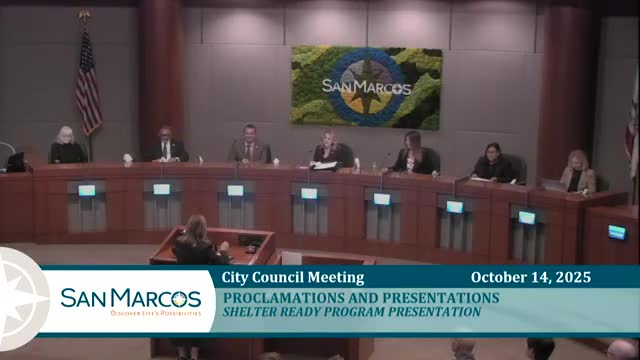San Diego district attorney pitches ShelterReady app to speed placements, track unmet shelter needs
Get AI-powered insights, summaries, and transcripts
Subscribe
Summary
District Attorney Summer Stephan told the San Marcos City Council about ShelterReady, a technology designed to match people experiencing homelessness to appropriate shelter beds quickly and to collect data on unmet needs.
District Attorney Summer Stephan presented ShelterReady to the San Marcos City Council as a tool to speed shelter placements and provide cities with data about who remains unsheltered and why.
Stephan said the Office of the District Attorney and partner agencies designed the system to improve the efficiency of shelter referrals and to capture information about “who we could not shelter and why,” so cities can target investments. “Think of it as a hotels.com or Expedia,” she said, describing a field-facing app that shows available beds and facility restrictions and that holds a reservation for 24 hours to allow outreach workers to deliver a person to shelter.
The presentation linked homeless services to public-safety concerns. Stephan cited office data saying people experiencing homelessness die of overdoses at a rate 132 times higher than the housed population, are murdered at 64 times the rate, and are charged with arson 305 times more often than non‑homeless people. She said residential burglary rates in the homeless population were 175 times higher. Stephan framed the work as both a humanitarian and public-safety imperative.
Stephan described how the system was built in consultation with shelters, fire and outreach staff, and law enforcement. She said the platform is already in use by multiple agencies: “319 current users, 185 are being vetted to enter the process of having that simple app on their phone,” and the team expects wider onboarding within a year.
She also reported operational results cited by partner agencies: Catholic Charities reported lowering outreach-worker time from about 40 hours a week to 15 hours a week after adopting the tool, freeing staff to shelter more people and provide services. Stephan said the app logs successful matches and also records when a reservation does not result in arrival and enrollment, which will allow the region to calculate unmet need by shelter type and population (for example, noncongregate options, disability-accessible beds, pet-friendly units).
Council members asked about onboarding and access. Stephan said Phase 1 focuses on professionals—fire, outreach workers, emergency rooms and shelters—and that Phase 2 would create public-facing kiosks (for example, in libraries) to allow people experiencing homelessness to check availability with the help of a navigator. She emphasized the platform is free for providers to join and that data ownership will be shared rather than retained exclusively by the district attorney’s office.
Mayor Jones and Councilmember Nunez thanked Stephan for the presentation and for the office’s emphasis on both prosecutions of crimes against people who are homeless and investments in sheltering. Stephan concluded by encouraging San Marcos staff and local providers to consider onboarding and by noting ongoing work to secure sustainable funding for related treatment programs.
